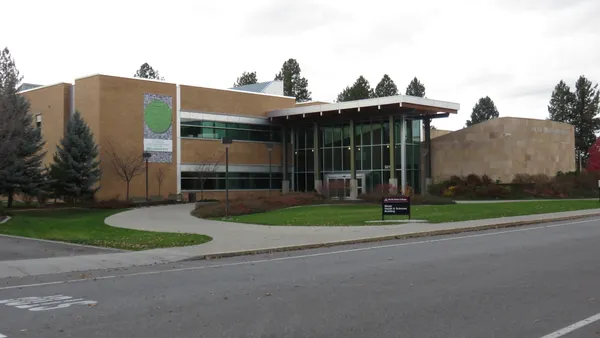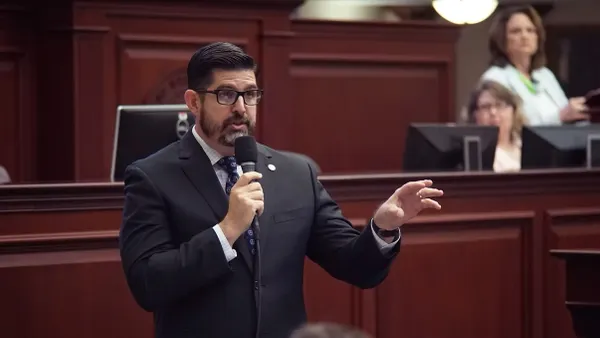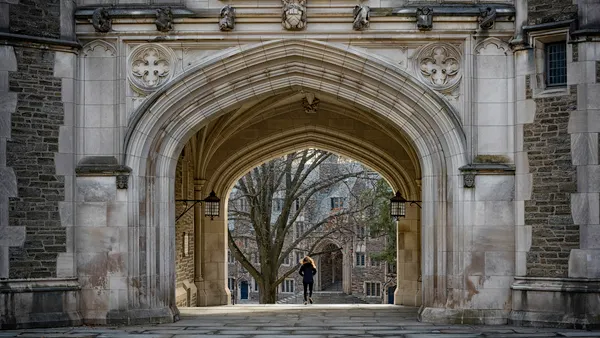Dive Brief:
- University of Nebraska-Lincoln’s chancellor on Monday unveiled a final budget recommendation that would cut four academic programs at the university, two fewer than he originally proposed in September.
- However, Chancellor Rodney Bennett’s new plan would eliminate two programs that a university committee voted to recommend keeping. His proposal also comes amid concerns raised by faculty over program evaluation metrics and the budget reduction process.
- The program cuts would trim $6.7 million from UNL’s budget, mainly through doing away with roughly four dozen full-time equivalent jobs. Bennett’s proposal also calls for merging four academic departments into two new schools and reducing budgets at four UNL colleges.
Dive Insight:
Ultimately, Bennett proposed axing UNL’s departments of Earth and atmospheric sciences; educational administration; statistics; and textiles, merchandising and fashion design — all as part of an effort to save $27.5 million annually to address a structural deficit.
He spared two programs that he recommended cutting earlier: landscape architecture, and community and regional planning. The University of Nebraska System’s regents plan to consider Bennett’s final recommendations at their December meeting.
Bennett’s initial proposal — and how he arrived at his recommended cuts — drew opposition from affected faculty and other stakeholders.
Based on hearings and nearly 3,000 filed comments, UNL’s Academic Planning Committee — made up of faculty, staff, administrators and students — voted in October to oppose closing four of the programs in Bennett’s original plan.
Two of those programs — statistics, and Earth and atmospheric sciences — are nonetheless on the chopping block in Bennett's final plan.
The committee didn’t oppose Bennett’s plans to cut the educational administration and textiles programs, or to merge UNL’s departments of entomology and plant pathology into one interdisciplinary school and the departments of agricultural economics and agricultural leadership, education and communication into another.
However, the committee called on Bennett and UNL leaders to extend the timeline for making existential decisions about any of the programs.
“We strongly recommend to the Chancellor, the President, and the Board of Regents that the approval of any budget cuts be delayed allowing time for units to identify creative alternative solutions that reduce or prevent the need for these cuts,” the committee said in an Oct. 24 memo. But Bennett and UNL leaders appear undeterred and are sticking with their original timelines.
The committee also pointed to concerns raised by UNL stakeholders about the metrics and data that officials used to decide on programs.
Faculty members have said that the data was incomplete and sometimes incorrect and that the administration wasn’t transparent with them about how programs were being statistically evaluated. They also contended that the programs' full value to the university and state weren’t taken into account.
UNL officials reviewed the programs “in accordance with performance metrics that align with UNL standards and external accountability frameworks,” Bennett said in a public message Monday. “The metrics were also shaped through extensive consultation in the spring with academic deans, college leadership teams, department executive officers and the APC.”
Still, some faculty continued to slam the metrics for a lack of transparency.
“What are these new performance expectations, and where do we find them?” Sarah Zuckerman, an educational administration professor at UNL and head of its American Association of University Professors chapter, said in a Tuesday blog post titled “No Real Metrics, Only Vibes.” UNL’s AAUP chapter has actively opposed the cuts.
Zuckerman added, “This feels like not only have administrators changed the rules of the game while it is still being played, but they didn’t bother to tell us.”
UNL’s faculty senate plans to consider a no confidence vote for Bennett on Nov. 18 over his handling of the budget cuts.















